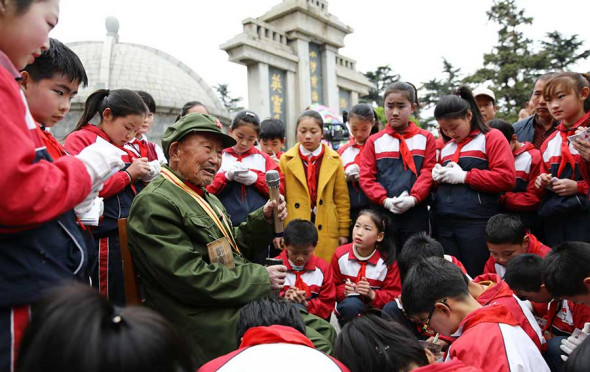
Ma Ruying, a veteran who fought in the War of Resistance Against Japanese Aggression (1931-45), shares his memories about the war with students at a cemetery in Lianyungang, Jiangsu province, on April 5, Tomb Sweeping Day. (Photo: Si Wei/For China Daily)
A law to protect the reputation and honor of heroes and martyrs will take effect on May 1.
The law was adopted at the bimonthly session of the Standing Committee of the National People's Congress Friday.
The country and the people should forever respect and remember the heroes and martyrs for their sacrifice and contribution to the Chinese nation and the people, according to the law.
The law, which promotes patriotism and socialist core values, bans activities that defame heroes and martyrs or distort and diminish their deeds.
It stresses that those who violate their rights of name, portrait, reputation, and honor will be punished.
It also outlaws acts that glorify invasions, with offenders facing administrative or criminal punishments according to the severity of their actions.
With the new law, the public will have a clearer understanding of what kind of behavior is not tolerated and what the consequences will be, and the government will have clear rules to follow when exercising their duty, said Xiong Wenzhao, a law professor at Minzu University of China and expert with the China Law Society.
The law includes content on the protection of memorials of heroes and martyrs, and publicity and education about them and their deeds.
A few recent incidents in which young people dressed in Japanese WWII army uniforms and spread photos online to glorify the war have provoked outrage among Chinese.
In another incident earlier this year, two young men were held by police after posing in front of ruins in Nanjing, dressed in the uniforms of Japanese invaders and holding "army weapons."
Nanjing is the site of the Nanjing Massacre. Japanese troops captured the city on Dec. 13, 1937. Over six weeks, they killed 300,000 Chinese civilians and unarmed soldiers.
"The new law encourages patriotic publicity and sends a loud warning against wrong behavior," said Zhang Jianjun, curator of the Memorial Hall of the Victims in Nanjing Massacre by Japanese Invaders.
Works of art involving national heroes and martyrs should also be based on historical facts and show respect, rather than mocking or excessively romanticizing them, said Wang Xingdong, a renowned screenwriter.
Besides allowing family members of heroes and martyrs to file lawsuits, the law also entrusts prosecutors to file public interest litigation cases against activities defaming heroes and martyrs.
"Defaming national heroes is in fact undermining the national spirit embodied by these heroes," Xiong said. "The state has the responsibility to protect the rights and interests of these heroes and the public interest behind them."


















































